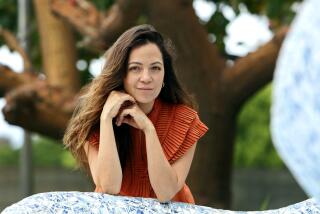POP MUSIC REVIEW : Looking Back, Moving Ahead : Natalie Cole Freer, Looser Now in Her Traditionalist Mode
- Share via
“For Sentimental Reasons” isn’t just a standard that Natalie Cole resurrects. It’s a theme song for her sudden career resurrection, as nostalgia-inclined listeners have swooned on cue to her remakes of Nat (King) Cole classics. Given her affection-inspiring bloodlines, in retrospect the idea might have come up a commercial winner even if Cole weren’t actually much good at this sort of stuff.
Fortunately, of course, she is. And she’s proven it by recording a second album of sturdy Tin Pan Alley oldies--most of them, this time, not associated with her dad--that’s even better than the first. Sans the familial novelty value, the new collection, “Take a Look,” isn’t turning out to be quite the sales blockbuster that its predecessor, “Unforgettable,” was. But her credibility with pop-jazz buffs isn’t suffering.
Nor is the popular want-to-see value, as a near-capacity house greeted the opening of her three-night stand with the Hollywood Bowl Orchestra at its home venue on Friday. For the intergenerational faithful, it was a rewardingly backward-looking evening: Cole, singing at the Bowl for the first time, made dutiful note of how she used to come see her father perform under the half-dome there.
And her penultimate number was the undismissible “Unforgettable,” the duet
with a video of Nat (King) Cole, ending with mutual kisses blown between daughter and ghostly visage--a shameless but irresistible moment you’d hate to deny the fans, even For Curmudgeonly Reasons.
The junior Cole is in a good place, though, having established her chops for traditional tunes and pretty much exhausted what she can do tribute-wise last time around. Freed from the onus of only singing dad’s catalogue, and armed with a well-chosen batch of equally historic but less obvious tunes, she’s freer and looser, having an equally good time with the Nat (King) Cole Trio-derived travelogue “Route 66” and the silly, dynamic scat of “Swingin’ Shepherd Blues.”
Her approach to the most easily recognized numbers allowed room for slight surprises of arrangement: Rather than the smooth, easy-listening route, “Mona Lisa” was afforded a more emotional, stop-and-start feel, emphasizing spare acoustic guitar backing over orchestration. And while “As Time Goes By” might better be left in the purgatory of over-familiarity, Cole gets credit for reattaching the little-heard, theory-of-relativity-invoking introduction, and taking the tune back to jazzier roots.
(These, like many of the selections, had the house strings essentially backing up the core that was Cole’s own traveling jazz quartet. The horn section, backup singers and conductor Charles Floyd were also part of Cole’s touring unit.)
The two highlights captured opposite ends of Cole’s current spectrum--the lush orchestral life of Billie Holiday’s brooding ballad of submission, “Don’t Explain,” and a surprise big-band treatment of “This Will Be,” her first hit from 1975 and the one inclusion here not from her two latest recordings.
“This one is mine, all mine!” she crowed, introducing the latter tune, which closed the show. Its successful inclusion suggested that rather than return directly to modern pop/R&B;, she perhaps ought to go one album further in her traditionalist mode and make it a trilogy, focusing in a final installment on contemporary material that could be cast in the vein of the classics. If she could maintain this high jazz style outside the comfortable climes of revivalism, her extended comeback might be all the sweeter.
The first half of the show was sans Cole, with John Mauceri conducting the Bowl Orchestra in a program made up mostly of early ‘50s film score excerpts. Alfred Newman’s overture for “How to Marry a Millionaire” (complete with expanded Cinemascope-era 20th Century Fox theme) provided as rousing a scene-setting for Cole as it did for Monroe, Grable and Bacall. More dramatic, noir -ish cues from Franz Waxman, Leonard Bernstein and David Raksin followed before Mauceri exited filmland for a Duke Ellington suite, “Harlem,” that was pretty much a movie all in itself.
Attendance for the first two weekend Bowl shows: Friday 17,058; Saturday 17,979.
More to Read
The biggest entertainment stories
Get our big stories about Hollywood, film, television, music, arts, culture and more right in your inbox as soon as they publish.
You may occasionally receive promotional content from the Los Angeles Times.










